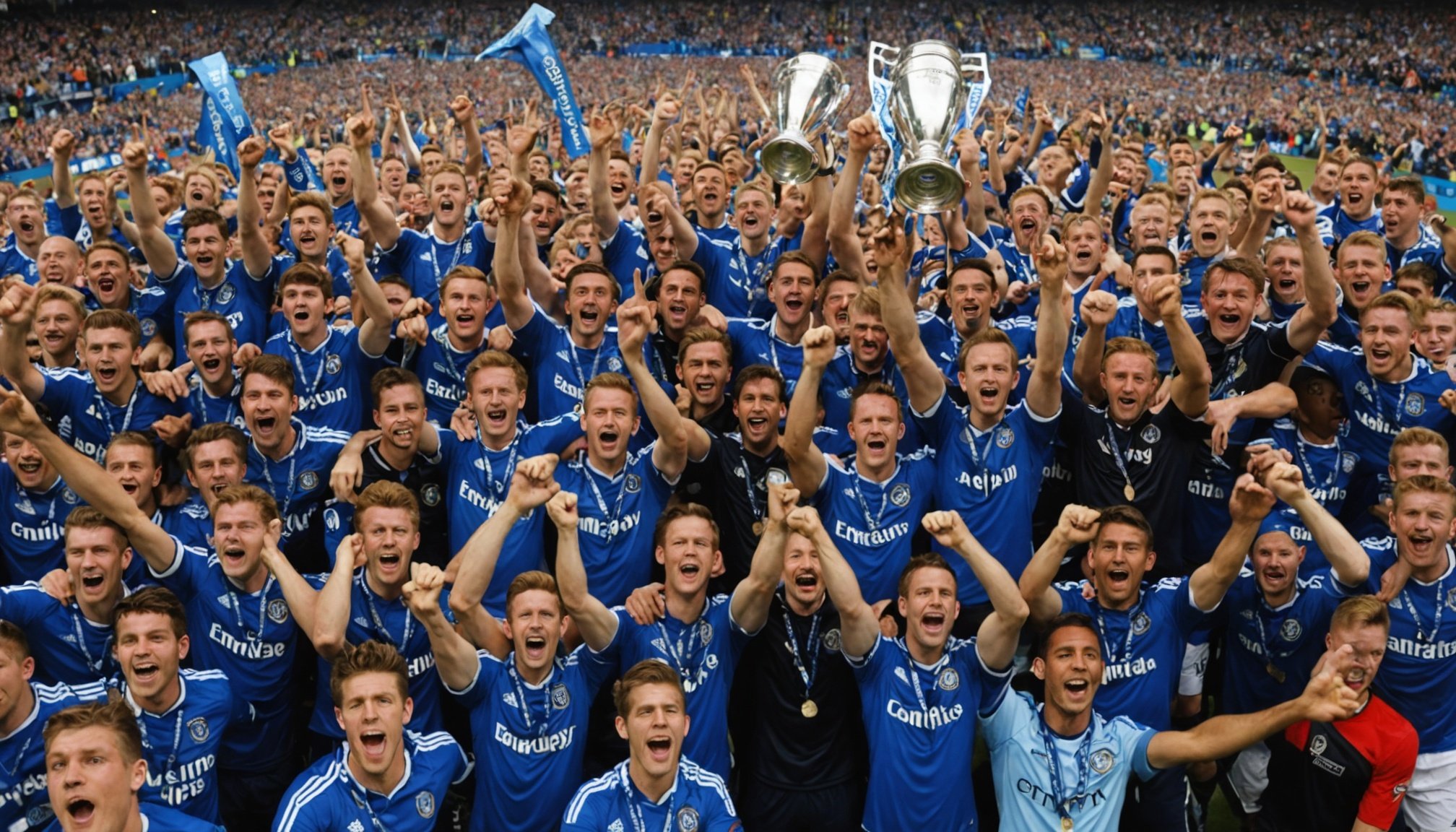The Power of Fan Loyalty: How Football Clubs Can Amplify Support and Achieve Success
Understanding Fan Loyalty in Football
Fan loyalty is a cornerstone of any successful football club. It is a form of sports spectatorship characterized by a strong sense of attachment and affiliation with a particular team or sport.
To grasp the significance of fan loyalty, it’s essential to delve into the psychological and emotional connections fans have with their teams. Research from the University of Kansas indicates that fans who identify heavily with a sports organization gain self-esteem and happiness through this association. This sense of identity and purpose is a powerful motivator for fan loyalty.
Also to see : Mastering On-Field Communication: Top Strategies for Football Players to Connect and Conquer
The Economic Impact of Fan Loyalty
Fan engagement and loyalty are not just emotional concepts; they have a direct impact on the financial health of football clubs. According to various studies, the more engaged and loyal the fans, the higher the likelihood of securing their financial support. This includes purchasing tickets, merchandise, and subscribing to league TV channels.
Here’s a breakdown of how fan loyalty translates into economic benefits:
Also to read : Essential Psychological Strategies to Enhance Confidence in Struggling Football Players
- Ticket Sales: Loyal fans are more likely to attend games regularly, ensuring consistent revenue streams.
- Merchandise: Fans who feel a strong connection to their team are more inclined to buy team-branded items.
- Media Subscriptions: Loyalty can drive fans to subscribe to TV channels and streaming services to watch their favorite teams play.
- Sponsorships: Brands are more likely to sponsor teams with a strong, loyal fan base, as it ensures greater exposure and engagement.
Leveraging Social Media for Fan Engagement
In today’s digital age, social media plays a pivotal role in fostering fan loyalty. Here are some strategies football clubs can use to engage their fans effectively through social media:
Create a Community
Building a community around the brand is crucial. This can be achieved by creating a unique hashtag that serves as a connection point between fans, allowing them to share their experiences and interact with each other.
Engage Meaningfully
Engage with fans in meaningful ways by creating conversations around topics that are important to them. This could include behind-the-scenes content, player interviews, and interactive polls and contests.
Utilize Social Media Platforms
Different social media platforms offer different engagement opportunities. For example:
- Facebook: Ideal for sharing detailed content, such as match analysis and player profiles.
- Twitter: Great for real-time updates and quick interactions with fans.
- Instagram: Perfect for visual content, including photos and videos of team activities and player lifestyles.
Example: Real Madrid’s Social Media Strategy
Real Madrid, one of the world’s most successful football clubs, has a robust social media strategy. With millions of followers across Facebook, Twitter, and Instagram, the club engages fans through exclusive content, live updates, and interactive sessions. This approach has helped Real Madrid maintain a strong global fan base and foster deep loyalty among its supporters.
Data-Driven Insights for Enhanced Engagement
Data analytics is a game-changer in understanding fan behavior and predicting future interactions. Here’s how football clubs can leverage data:
Segmenting Fans
Use behavioral, demographic, and psychographic data to create meaningful fan segments. For example, target fans based on game attendance frequency, merchandise purchases, age groups, or content consumption patterns.
Personalizing Content
Adjust email content, website experiences, or app notifications based on individual fan preferences and behaviors. This could mean showcasing different hero images or calls-to-action for different segments.
Predictive Modelling
Use machine learning algorithms to predict which fans are most likely to respond to specific offers or content types, allowing for more precise targeting.
Gamification and Loyalty Programs
Gamification can elevate ordinary loyalty programs into engaging experiences that resonate with sports fans. Here are some elements to consider:
- Points: Reward fans for specific actions, such as attending games or sharing content on social media.
- Badges: Acknowledge achievements by awarding fans badges for milestones like attending a certain number of events.
- Leaderboards: Show fans how they rank against others, fostering a sense of competition and motivating them to engage more.
Digital Collectibles and NFTs
Digital collectibles, including Non-Fungible Tokens (NFTs), are becoming increasingly popular in the sports industry. Here’s how they can drive fan loyalty:
Creating Digital Collectibles
Football clubs can create digital collectibles that represent unique assets, such as player cards or match highlights. These can be owned, traded, or exchanged for other items of value.
Example: NBA Top Shot
NBA Top Shot is a notable example of how digital collectibles can engage fans. By offering unique, tradable moments from NBA games, the platform has created a new way for fans to connect with their favorite teams and players.
Measuring Fan Engagement Success
To ensure that fan engagement strategies are effective, it’s crucial to measure their success using various metrics. Here are some key performance indicators (KPIs) to consider:
Engagement Metrics
- Track likes, shares, and comments on social media posts.
- Monitor the number of fans participating in polls and contests.
- Analyze the open rates and click-through rates of email campaigns.
Financial Metrics
- Track ticket sales and merchandise purchases.
- Monitor the number of subscriptions to the league’s TV channel.
- Analyze the revenue generated from sponsorships and partnerships.
Table: Comparing Fan Engagement Strategies
| Strategy | Description | Benefits |
|---|---|---|
| Social Media Engagement | Use social media platforms to engage fans through content and interactions. | Increases fan loyalty, drives traffic to the website, and boosts merchandise sales. |
| Data-Driven Insights | Use data analytics to segment fans and personalize content. | Enhances engagement, predicts future interactions, and improves marketing effectiveness. |
| Gamification | Implement gamified loyalty programs with points, badges, and leaderboards. | Fosters a sense of competition, increases repeat interactions, and strengthens fan connections. |
| Digital Collectibles | Create and distribute digital collectibles and NFTs. | Drives fan loyalty, creates a sense of ownership, and generates new revenue streams. |
| Community Building | Create a community around the brand through unique hashtags and content. | Encourages fan interaction, builds a sense of belonging, and increases brand advocacy. |
Practical Insights and Actionable Advice
For football clubs looking to amplify fan support, here are some practical insights and actionable advice:
Know Your Fans
Understand the desires, wants, needs, and motivations of your fans. This is critical to creating a successful fan engagement strategy.
Be Authentic
Align your brand with the emotions and values of your fans. This creates lasting connections and increases the likelihood of fan loyalty.
Leverage Influencer Marketing
Collaborate with influencers, athletes, or other sports organizations to elevate your brand’s reach and credibility. Partner with individuals or entities that share your values and appeal to your target audience.
Stay Adaptive
Embrace modern technology and creative campaigns. The sports industry is ever-evolving, and staying ahead of the curve is crucial for maintaining fan engagement.
Fan loyalty is the lifeblood of any successful football club. By leveraging social media, data-driven insights, gamification, and digital collectibles, clubs can foster deep emotional connections with their fans. Understanding the psychological reasons behind fan loyalty and implementing effective engagement strategies can significantly enhance a club’s success both on and off the field.
As Cortex’s work with Premiership Rugby and SA20 has shown, the right strategies can lead to substantial increases in engagement and revenue. By creating meaningful connections, personalizing content, and using advanced tools for fan data analysis, football clubs can ensure long-term brand equity and a loyal fan base.
In the words of a sports marketing expert, “Fans are not just spectators; they are the heart and soul of the sport. By engaging them in meaningful ways, we can build a community that transcends the game itself.” By embracing these strategies, football clubs can turn their fans into lifelong supporters, driving success and loyalty for years to come.











